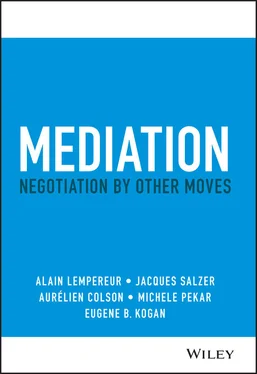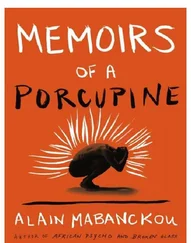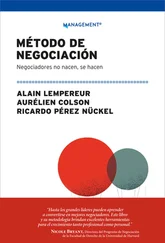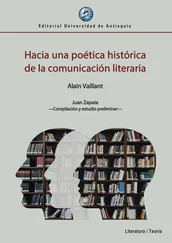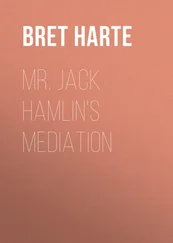Impose – When one party considers themselves to be right, they may want to get a sanction imposed, without paying attention to the desires and justifications of the other party. As mediation necessitates a minimum amount of listening and comprehension, it does not respond well to a pure demand of imposition. However, experience underscores that parties in this state of mind, when they are involved in mediation (for example, at a judge's request or in application of a contractual clause of compulsory mediation), can evolve if they find in the other party a recognition of the legitimacy of their claim for compensation.
Avenge – The culture of “an eye for an eye, a tooth for a tooth” refers to a logic of retaliation, which mediation stays away from. However, seeking vengeance implicitly expresses a demand for justice that mediation can help to recognize and reformulate. Mediation can be appropriate as a place where a lucid diagnostic of a situation emerges, including the suffering inflicted and felt, and consequently where the terms of a proportionate and legitimate compensation for the damage committed are discussed.
Punish – This demand differs from the logic of retaliation, as it does not aim to make the other suffer what we suffered, but to sanction through legal proceedings. This punishment is deemed to compensate for the misdeed – retributive justice – and to prevent its future recurrence – deterrence justice. It requires the intervention of an authority – hierarchical, judicial – whose role is to deliver a penalty – judicial sentence. Even when a willingness to punish exists, criminal mediation is used, notably for minor offenses (Lempereur 1999c). It provides an avenue of action for cases that would be otherwise dismissed. For example, it increases the chances that the “small” delinquents will understand their impact on the victims and acknowledge their wrongdoing through an apology. It also empowers the complainant, who can shape the compensatory measures.
Speed is a primary criterion in some types of decision‐making, in everything from the most mundane situations – settling a disagreement between teams at a sporting event – to the most serious – assigning responsibilities in the management of an industrial accident, or in hostage situations. Faced with a problematic situation where time is of the essence, and as mediation is not the fastest approach, it is often not the most pertinent.
In a soccer match, could the two teams discuss, negotiate, or mediate for hours to arrive at a shared decision on whether or not a player is offside? Night would fall on the field without the match continuing. With the support today of video replay, accepting the referee's decision is preferable to guarantee speedy decisions and to resume the match, even if it does not satisfy a particular player or team and feeds the newspaper columns the next day.
Thus, each time the situation demands a form of swiftness in decision‐making – to avoid prolonged blockage, deterioration, even a human disaster – intervention by an authority proves itself essential. This aspect is reinforced in a situation where the decision also involves precise technical, scientific, or legal issues: turning with confidence to a subject matter expert allows everyone to save time.
The fact remains that this preference for speed is carried out to the detriment of other criteria, including the quality of a decision – notably its perceived legitimacy by the involved parties. A prompt decision, without taking time to exchange, inhibits a deep reciprocal understanding, leaves the underlying causes of the conflict intact, does not guarantee that the most appropriate decision will be made, and nor does it prevent the recurrence of conflict. There is, in defense of mediation, a tension between the speed and sustainability of the decision, between immediacy and legitimacy. Mediation, because of its slow and more careful decision‐making style, favors comprehensive conflict resolution. In this spirit, an authority, like a judge, can order an “urgent” mediation, which will make it possible – by immediately taking the useful time of reciprocal explanation – to unfreeze a situation. As long as it is conducted “within a specific timeframe,” this mediation can not only be urgent, but quickly finished, successfully or not. For example, before deciding if the occupation of a factory is legal or not, a judge may order a swift mediation between the parties before making a decision.
What is at play deep down concerning whether or not to resort to mediation is the organization of exchanges. Mediation complements other approaches of conflict intervention by providing an original division of labor. On one side, decision‐making stays with the parties. On the other side, mediators are in charge of the process and the organization of exchanges, allowing parties to concentrate on the problems, without being concerned about “Who is going to talk after whom?” and “Have I been listened to and understood well?” Mediators become like translators from English to English and from feeling to feeling, helping the parties to listen and understand each other, even when there is no particular decision to make. While the mediator focuses on the process, the parties are able to concentrate on their relationship and the problem at hand. The mediator ensures that the process is appropriate to increase the chance of resolution at every moment.
Faced with multiple approaches to third‐party interventions, why choose mediation? The following paragraphs will explore a series of justifications which complement more intuitive criteria, linked to our culture and personal values. Research and experience distinguish between two types of justifications favoring the use of mediation: the first is linked to the past to overcome; the second focuses on a future to (re)construct. Let us examine both.
A Past to Overcome: Seven Justifications in Favor of Mediation
This first series of justifications focuses on barriers from the past that prevent progress in the present. What typical blockages can a mediation surmount?
Communication and Relationship Breakdown
A parent has not seen their child for 10 years. An owner does not respond to an urgent request from a tenant. A business does not deliver an order despite multiple messages. In every case, one party avoids contact for multiple possible reasons: the fear of blame, aggression, or shaming by the other party; the desire to no longer suffer from (physical or verbal) abuse; the difficulty of fulfilling a contract; the other's rejection; or even a position of strength resulting in denying any demand.
Accepting the presence of a neutral person between oneself and the other constitutes a first step in renewing the dialogue. Sometimes, simply learning that “the other” proposes mediation is perceived as a sign of opening and suffices to relaunch direct negotiations resulting in a solution, without the need for external mediators.
In cases of a complete relationship breakdown, it proves useful to involve a third party, who plays the role of a messenger between the parties. There are two possibilities:
The parties agree to meet one another: The mediator reunites them in joint meetings, except if the choice is made to hold private meetings.
The parties refuse to meet one another but agree to communicate through the mediator: The mediator meets them in turn and engages in “shuttle diplomacy.” By carrying the messages between the parties and giving their own perceptions or suggestions on the evolution of the relationship, the mediator plays the role of a mutual spokesperson. As a result, either the parties change their perceptions of “the other,” and agree to meet, or the process proceeds without any physical meeting.
Читать дальше
